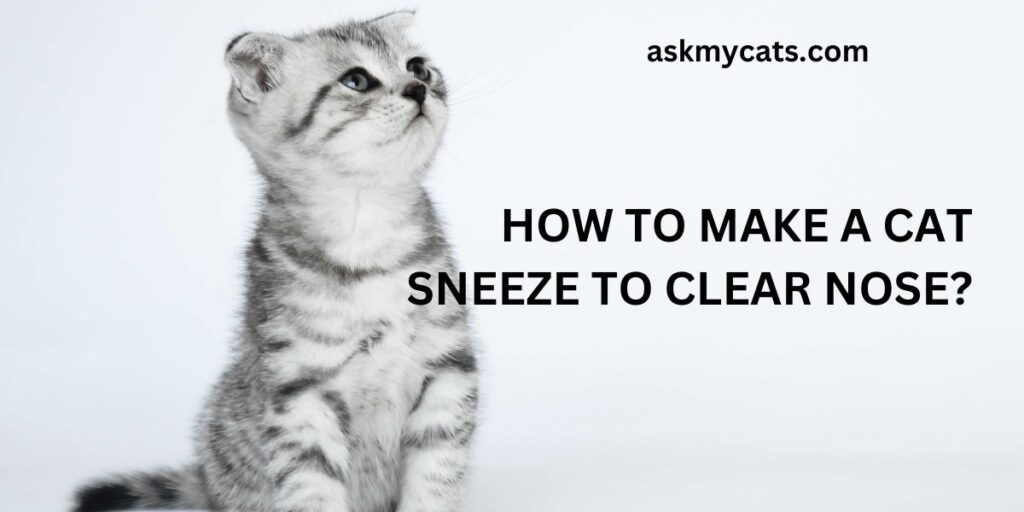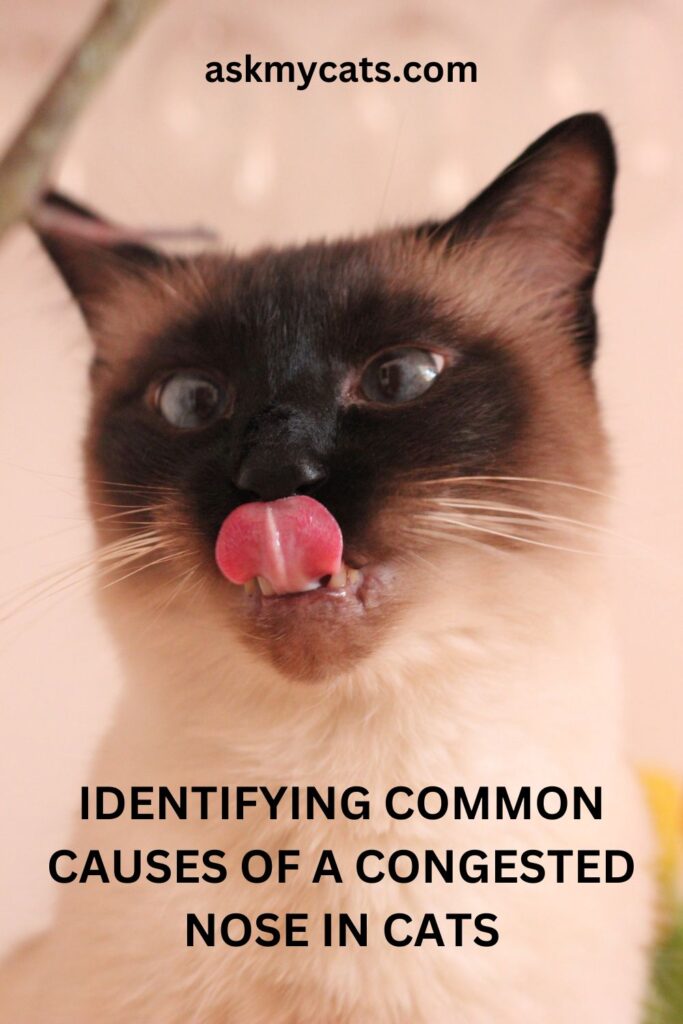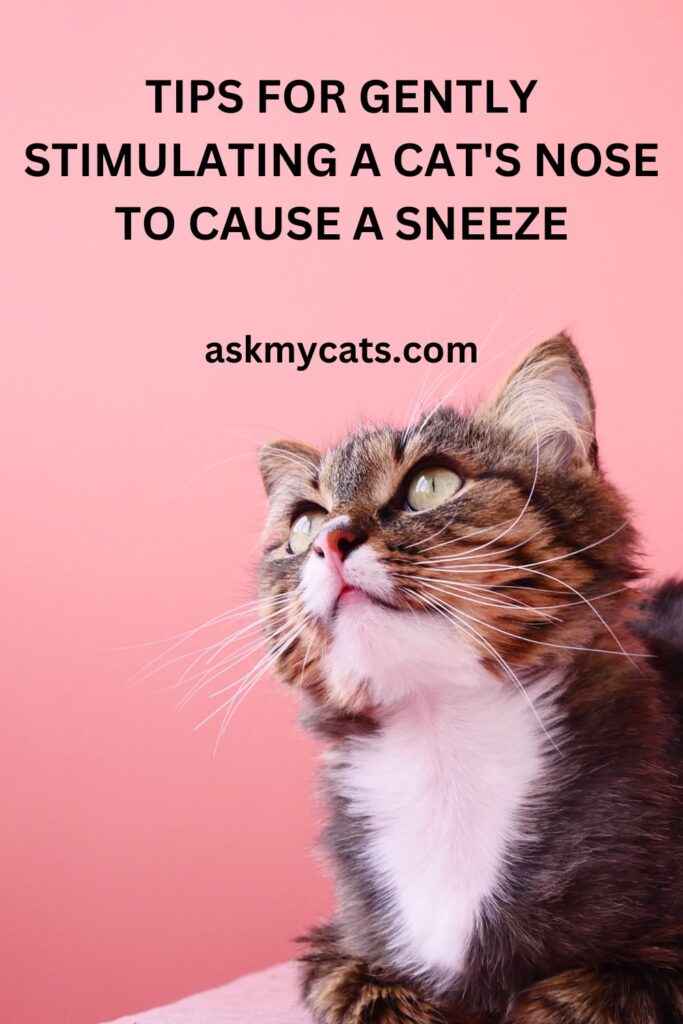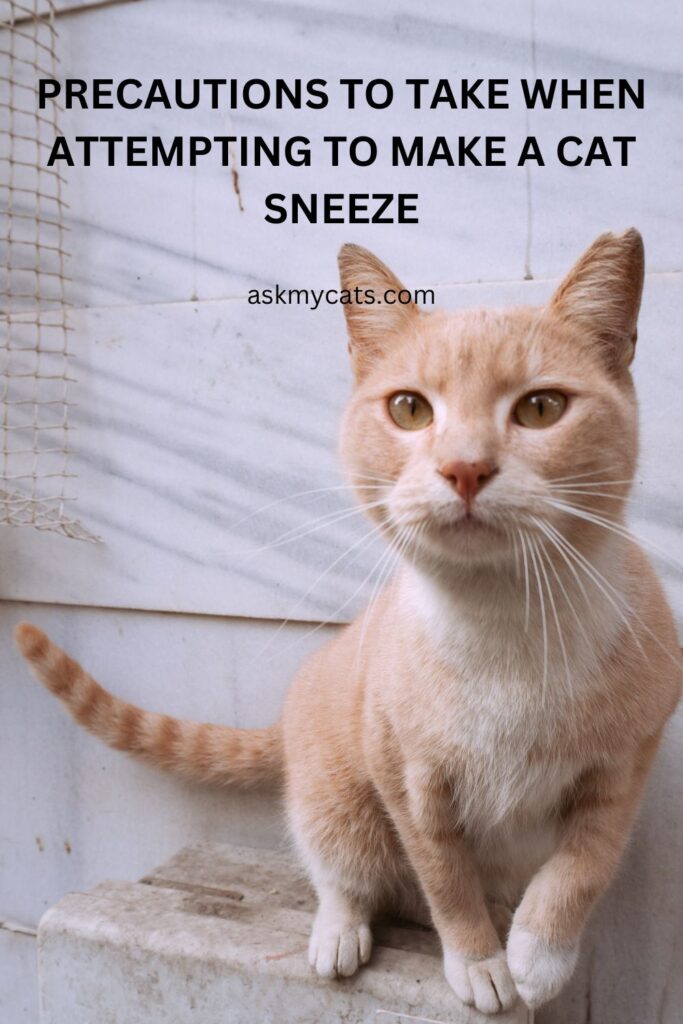Cats are known for their grace, agility, and aloofness, but they are not immune to the occasional cold or allergy. Just like us humans, cats can also experience nasal congestion, making it difficult for them to breathe properly.
While a sneeze may seem like an inconvenience to us, it can actually help clear out their nasal passages and provide much-needed relief.
So, if you’re wondering how to make a cat sneeze to clear its nose, read on to discover some safe and effective methods to help your feline friend breathe easier.
Key Takeaways
- Gentle methods to stimulate a cat’s nose and cause a sneeze include using a feather, catnip, a scent, or a tissue, but these should only be used if recommended by a veterinarian.
- Natural methods can be beneficial in treating nasal congestion in cats as they have fewer side effects, are cost-effective, safer for cats, and non-invasive.
- Precautions to take when attempting to make a cat sneeze include being gentle, using safe methods, and seeking veterinary advice if the cat’s nasal congestion is due to an underlying health issue.


Give Your Cat the Perfect Day
Get the Free Ebook!
Understanding Why A Cat’s Nose May Need To Be Cleared
As a cat owner, you may have noticed your furry friend sneezing or sniffling from time to time. While an occasional sneeze is normal, frequent or prolonged sneezing could be a sign of nasal congestion.
Just like humans, cats can also suffer from allergies, infections, or other respiratory issues that cause their nasal passages to become inflamed or congested. This can lead to difficulty breathing, loss of appetite, and other uncomfortable symptoms.
Clearing a cat’s nose can help relieve these symptoms and improve its overall quality of life.
Identifying Common Causes Of A Congested Nose In Cats

Nasal congestion is a common problem in cats and can be caused by a variety of factors. Here are some of the most common causes of a congested nose in cats:
- Allergies: Cats can be allergic to a wide range of substances, including pollen, dust, mold, and certain foods. When a cat is exposed to an allergen, it can cause its nasal passages to become inflamed and congested.
- Upper respiratory infections: Just like humans, cats can catch colds and other respiratory infections. These infections can cause a range of symptoms, including a congested nose, coughing, and sneezing.
- Foreign objects: Cats are curious creatures and may sniff or lick foreign objects, such as small toys or grass, which can get stuck in their nasal passages and cause congestion.
- Dental problems: Dental issues, such as infected teeth or gums, can cause a cat’s nasal passages to become inflamed and congested.
- Tumors: In rare cases, tumors or polyps in a cat’s nasal passages can cause congestion and other respiratory symptoms.
Must Read: How To Clean A Cat’s Nose? Safely and Effectively!
Tips For Gently Stimulating A Cat’s Nose To Cause A Sneeze

If your cat is suffering from nasal congestion, causing a sneeze can help clear its nasal passages and provide relief. Here are some tips for gently stimulating a cat’s nose to cause a sneeze:
- Use a feather: Gently tickling your cat’s nose with a feather can often cause them to sneeze. Make sure to use a soft feather and be very gentle to avoid irritating their nose.
- Try catnip: Some cats are sensitive to catnip and may sneeze when exposed to it. Sprinkle a little bit of catnip on your cat’s nose to see if it stimulates a sneeze.
- Use a scent: Strong scents, such as peppermint or eucalyptus, can also stimulate a sneeze. However, it’s important to use these scents sparingly and make sure they are safe for cats.
- Use a tissue: Gently wiping your cat’s nose with a tissue can also stimulate a sneeze. Be sure to use soft tissue and be very gentle.
It’s important to note that while these methods can be effective in causing a sneeze, they should only be used if your veterinarian has recommended them.
If your cat’s nasal congestion is due to an underlying health issue, it’s important to address the root cause rather than just treating the symptoms.
Must Read: Effective Home Remedies for Cat Nasal Congestion
The Importance Of Using Natural Methods Over Medication
While medication can be an effective treatment for nasal congestion in cats, it’s important to consider natural methods as well.
Here are some reasons why using natural methods over medication can be beneficial:
- Fewer side effects: Many medications can cause side effects in cats, such as drowsiness, diarrhea, or vomiting. Natural methods, such as using a humidifier or steam, do not have these potential side effects.
- Cost-effective: Natural methods are often less expensive than medication and can be just as effective in treating nasal congestion.
- Safer for cats: Some medications can be dangerous for cats, especially if not given in the correct dose. Natural methods, such as using saline drops or wiping your cat’s nose with a tissue, are generally safe and do not pose any risk to your cat’s health.
- Non-invasive: Natural methods are non-invasive and do not require any injections or procedures that could cause your cat discomfort or stress.
While medication may be necessary in some cases, it’s always a good idea to discuss natural methods with your veterinarian and explore them as a first line of defense for treating your cat’s nasal congestion.
Must Read: All About Cat Nasal Congestion
Precautions To Take When Attempting To Make A Cat Sneeze

When attempting to make a cat sneeze to clear its nose, it’s important to take certain precautions to ensure its safety and well-being.
Here are some precautions to keep in mind:
- Be gentle: When trying to stimulate a sneeze, be very gentle and avoid causing any discomfort or irritation to your cat’s nose.
- Avoid irritants: While some scents can stimulate a sneeze, it’s important to avoid using any irritants that could cause harm to your cat’s respiratory system. For example, never use pepper or other strong spices.
- Consult your veterinarian: Before attempting any home remedies or natural methods, it’s always a good idea to consult with your veterinarian to ensure that they are safe and appropriate for your cat’s specific condition.
- Avoid overstimulation: Trying too hard to make your cat sneeze can be counterproductive and may cause unnecessary stress or discomfort for your cat.
- Monitor your cat: Keep a close eye on your cat’s behavior and symptoms, and if you notice any changes or worsening of their condition, seek veterinary attention immediately.
Interesting Read: Effective Home Remedies for Cat Runny Nose
Tips For Preventing Congestion In A Cat’s Nose In The Future
Preventing congestion in a cat’s nose is important for its overall health and well-being. Here are some tips for preventing congestion in your cat’s nose in the future:
- Keep your home clean: Regularly cleaning your home can help reduce the amount of dust, pollen, and other allergens in the air that can cause nasal congestion in cats. This includes dusting, vacuuming, and washing bedding and curtains.
- Use a high-quality air filter: Using a high-quality air filter in your home can help reduce the number of airborne irritants and allergens that can cause nasal congestion in cats.
- Avoid smoking around your cat: Smoke from cigarettes and other tobacco products can irritate your cat’s nasal passages and cause congestion. Make sure to avoid smoking around your cat and keep your home smoke-free.
- Keep your cat’s vaccinations up-to-date: Vaccinations can help prevent upper respiratory infections in cats, which can cause nasal congestion and other respiratory symptoms.
- Maintain good dental hygiene: Dental issues can cause nasal congestion in cats, so it’s important to maintain good dental hygiene by regularly brushing your cat’s teeth and scheduling dental check-ups with your veterinarian.
By taking these preventive measures, you can help keep your cat’s nose clear and prevent future episodes of nasal congestion.
Interesting Read: Runny Cat Nose: Causes, Symptoms, and Remedies
When To Seek Veterinary Assistance For A Congested Cat Nose
While mild cases of nasal congestion in cats can often be treated with home remedies and natural methods, there are situations where it’s important to seek veterinary assistance.
Here are some signs to watch for that may indicate your cat needs veterinary attention:
- Persistent nasal discharge: If your cat’s nasal discharge persists for more than a few days or is accompanied by other symptoms, such as lethargy or loss of appetite, it’s important to seek veterinary attention.
- Difficulty breathing: If your cat is having difficulty breathing or seems to be struggling to catch their breath, seek veterinary attention immediately.
- Sneezing or coughing up blood: If your cat is sneezing or coughing up blood, seek veterinary attention immediately, as this may indicate a serious underlying condition.
- Loss of appetite: If your cat is refusing to eat or drink, this can be a sign of a serious illness and requires prompt veterinary attention.
- Behavioral changes: If your cat is showing unusual behavior, such as hiding or becoming aggressive, this may be a sign of pain or discomfort and requires veterinary attention.
Frequently Asked Questions
Can I use human decongestants on my cat?
No, it’s not safe to use human decongestants on cats without first consulting a veterinarian.
Can I use a humidifier to help my cat breathe easier?
Yes, using a humidifier can help relieve nasal congestion in cats by increasing moisture in the air.
How can I prevent my cat from getting nasal congestion?
Regular cleaning, good dental hygiene, and avoiding irritants and allergens can help prevent nasal congestion in cats.
Is it normal for a cat to sneeze occasionally?
Yes, occasional sneezing is normal for cats, but frequent sneezing or other respiratory symptoms may indicate an underlying issue.
When should I seek veterinary attention for my cat’s nasal congestion?
Persistent nasal discharge, difficulty breathing, blood in sneezing or coughing, loss of appetite, or behavioral changes are all signs that veterinary attention is needed.
Final Words
Clearing a congested nose in cats is important for their comfort and overall health. While natural remedies can be effective, it’s important to take precautions and seek veterinary attention when necessary to ensure your cat’s safety and well-being.
Preventative measures such as regular cleaning and good dental hygiene can also help prevent nasal congestion in cats.
Interesting Read: Why Does My Cat Have A Dry Nose?
